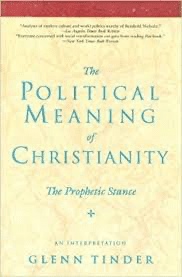The Political Meaning of Christianity: Ambivalence
Here I take up two more parts or sections of Chapter Four “Social Transformation.” They are “Private Property and Capitalism” and “Mass Society” (pp. 180-195).
The them running throughout this book but highlighted in these two sections is ambivalence—ambivalence toward politics and all things associated with it. The Christian, for Christian reasons, ought always to have a posture of ambivalence toward politics but also toward economics and social organizations.
In Private Property and Capitalism Glenn Tinder deconstructs capitalism in light of Christian ideals: “The very concept of human ownership is in tension, if not outright conflict, with the idea that the things we need are given to us by God; people are likely to wish not merely for things that present needs but for barns full enough to provide independence from the daily gift of bread.” (183) And “If a prophetic outlook entails deep misgivings about private property, how much deeper must those misgivings be about capitalism. All that is dubious in private ownership seems, at least for owners, to be emphasized by the capitalist system.” (184)
For Tinder, the only thing worse that capitalism, economically and politically, is Marxism. And he has nothing good to say about socialism. “Christians will be open to the possibility that among economic systems, all of them highly imperfect, capitalism may be the most workable.” (182)
In Mass Society Tinder turns to the principle of equality and argues that while equality is a generally good ideal its expression in “equalization” or what he calls “mass society.” He relies heavily on Alexis de Tocqueville here and says that “Equalization is a dangerous undertaking.” (186) Equalization means “the tyranny of the majority” in which authority is “always near at hand: everyone.” (187) He decries the disappearance of public intellectuals who are respected for their wisdom. In mass society equalization everyone is the authority and expert and therefore nobody is. Culture becomes degraded as people have nobody to hold them back from giving in to their baser instincts and impulses.
The result of mass society equalization, Tinder avers, is “degraded popular culture.” (192) His alternative brings to mind Paul Tillich’s ideal of a “theonomous society.” It is the principle the priority of spirit. Spirit must precede both equality and order. What spirit? That he is going to tell us in Chapter Five “Prophetic Spirituality.” I plan to discuss that chapter as a whole in two weeks (by May 20). It is time to bring consideration of this book to an end. While the book has much to say that is valuable, its study and discussion here is dragging out.
Again, I must agree with Tinder about capitalism and mass society. I feel very ambivalent about capitalism because I am a Christian. It is an economic system based on selfishness and greed and, without many qualifications in law and policy, leads inevitably to a continually growing gap between the rich and the poor with the rich forming a smaller percentage of society and the poor a greater one and increasing large. Also, I agree that what Tinder calls mass society is degrading toward culture. Tinder puts our contemporary American culture so well: “Instead of entering into common efforts to uncover the truth of the meaning of our lives…we devote our time and abundant resources to every pleasure and diversion to which people can be profitably attracted.” (193)
*If you choose to comment, make sure you have read the relevant pages in the book. If not, you may ask questions. In either case, keep your writing to no more than 100 words (across one or more comments per day). Keep it on topic, addressed to me, civil and respectful, not hostile or argumentative, and devoid of pictures or links.*














